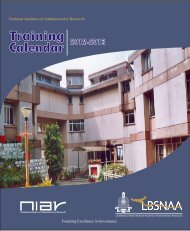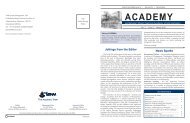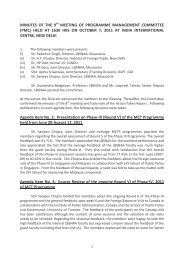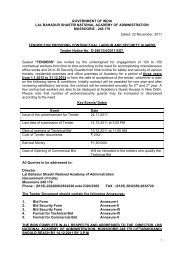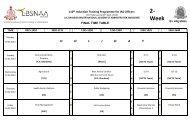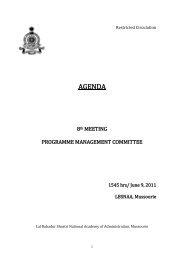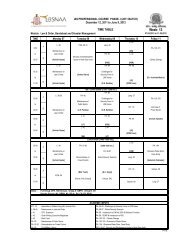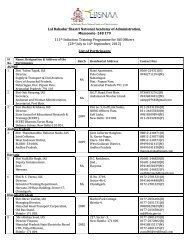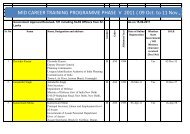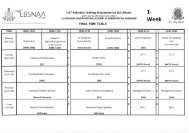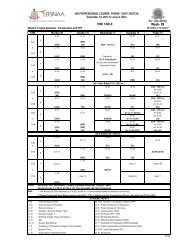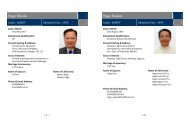Free Download - lbsnaa
Free Download - lbsnaa
Free Download - lbsnaa
Create successful ePaper yourself
Turn your PDF publications into a flip-book with our unique Google optimized e-Paper software.
6 The Academy Oct.-Nov. 2008 7 The Academy Oct.-Nov. 2008<br />
of Women and Child, Orissa, to assess the state<br />
government's “Mahila Shishu Desk” initiative. The<br />
main aim of the study is to highlight the lessons<br />
learnt from the ongoing activities and design a<br />
roadmap for continuous improvement to<br />
institutionalize the best practices.<br />
<br />
<br />
<br />
Seminars/ Symposium<br />
A National Level Conference on<br />
'Mainstreaming Gender Issues' was organized<br />
by the National Centre for Gender Training<br />
and Research on 13th to 15th November, 2008<br />
The National Institute of Administrative<br />
Research ( NIAR) at the benediction and<br />
benefaction of the 'Thirteenth Finance<br />
Commission' organized a National Level<br />
Workshop on “Development of Indicators of<br />
Governance” at Indian International Centre,<br />
New Delhi on 14th November, 2008.<br />
VIII Central Training Institute's Conference,<br />
The VIII conference hosted in Academy on<br />
16th October,2008 was in continuum to the<br />
previous conferences held in succession at<br />
various Central Training Institutes.<br />
Networking and sharing training resources<br />
amongst the Central Training Institutes was<br />
the pivotal theme of the conference. The<br />
deliberations triggered by collective wisdom<br />
resulted in quite a few novel<br />
recommendations, to name a few, the<br />
volunteership offered by Foreign Service<br />
Institute New Delhi to facilitate international<br />
training programmes for officers of varied civil<br />
services, creation of a Consortium of CTIs ,<br />
holding a thematic training module at the<br />
Academy for the different batches of yester<br />
years foundation courses that comprise of the<br />
conglomeration of officers from all the civil<br />
services.<br />
Faculty Publications<br />
An article on “NICTU An ICT Training Hub for<br />
Civil Servants” was published in Informatics An e-<br />
governance bulletin from NIC, Volume 17, No. 1,<br />
July 2008 jointly authored by NICTU Team.<br />
A Research Paper entitled “Women in Rural Indian<br />
Households and Energy Needs: Struggle and Solace<br />
Cultural Perspective to Reality” authored by<br />
Dr. N. K. Kumaresan Raja , Professor, Centre for<br />
Rural Studies was published in the Edited Volume<br />
on “The Culture of Energy” by Mogens Rudiger,<br />
Cambridge Scholars Publishing, UK, 2008<br />
Publications from the 'Cannons of<br />
Research' of the Academy<br />
The Academy proudly brings out two 'Journals',<br />
with and of profound professional acumen in the<br />
endeavor of translating the motto of the Academy<br />
by way of publications.<br />
The Administrator<br />
The Journal operates as a mirror of issues<br />
pertaining to contemporary issues in Indian as<br />
well as Global Public Administration. We are<br />
proud to hear from our officer trainees that the<br />
journal was a part of their life jackets during their<br />
gauntlet years of swimming in the waters of Civil<br />
Services Exams finding the shores!<br />
Service Quality<br />
“Service Quality”- the mitochondrion of the<br />
principles of “Total Quality Management”, a<br />
prodigy from the neurons of Shri. Padamvir Singh,<br />
the Joint Director, deciphers his aims of redefining<br />
the pre-established definitions of “Service Quality”<br />
of delivery systems in Government<br />
Administration.<br />
Utmost importance is given for 'out of box<br />
thinking' to ensure optimum quality, confirming<br />
to international benchmarks in every public<br />
service delivery system and articles spearheading<br />
such visions and missions of discovering the<br />
indicators ensuring “Service Quality” is the focal<br />
theme of the contents of the Journal.<br />
Retreat for the 1958 batch<br />
Arti Ahuja*<br />
The batch of 1958 was unique- it was the last batch of<br />
the IAS to be trained at the Metcalfe house in Delhi.<br />
After that, the training was shifted to the National<br />
Academy, as it was then called, at Mussoorie. From<br />
Metcalfe and its proximity to the powers at Delhi, to<br />
the cool, meditative environs of Mussoorie was<br />
indeed a quantum jump, literally and figuratively, for<br />
the idea of training civil servants. This was evident in<br />
the reminiscences of the batch- they recounted with<br />
delight their close interaction with the Prime Minister<br />
Mr Jawaharlal Nehru and other dignitaries including<br />
the Home Minister Mr Pant, before whom they<br />
successfully protested against shifting the Academy<br />
to Mussoorie during their training period! Metcalfe<br />
house, with its colonial grandeur and sprawling<br />
lawns symbolized the handing over of the reigns of<br />
government from the ICS to the IAS and the IFS. The<br />
batch was understandably nostalgic about the time<br />
spent there, and we were regaled with numerous<br />
stories about the training there.<br />
21 members of the batch, some with their spouses,<br />
attended the retreat. Members of the batch, who were<br />
no more, were fondly remembered by the entire<br />
batch before the proceedings started. For the first<br />
time, members of the Indian Foreign Service who<br />
were trained together with the batch at Metcalfe<br />
house were invited. One officer attended the retreat,<br />
and his reminiscences added depth to the<br />
deliberations. It was a pleasure for the faculty to be<br />
part of the sharing of their memories-the group had<br />
many highly distinguished members, who had<br />
achieved excellence in their careers as well as beyond<br />
that. They had braved many odds and achieved a lot<br />
for the country in the areas they had worked in. The<br />
batch also has been highly prolific-we were initially<br />
able to find 16 books written by the batch members,<br />
with more coming to light during the deliberations!<br />
During the retreat, the 82nd Foundation Course was<br />
also going on. Escort Officers from the FC were able<br />
to have a close and meaningful interaction with the<br />
seniors. There was also a structured panel<br />
discussion with all the young Officer Trainees of the<br />
Foundation Course- an experience that was found<br />
very useful by both groups. The 1958 batch also<br />
contributed to the training inputs by giving their<br />
suggestions on various areas of concern for the<br />
officer trainees. This was done through discussion<br />
in groups and arriving at a set of recommendations.<br />
The retreat was given a touch of warmth and colour<br />
by the spouses who gamefully sang at the Director's<br />
dinner and braved the sporadic rain showers at the<br />
valedictory in Polo ground. The last group photo<br />
with the ubiquitous umbrellas become probably the<br />
defining moment of the retreat and the batch gettogether.<br />
There were moments of rain and sunshine,<br />
but they were all greeted with good humour and<br />
immense camaraderie and grace. This was how the<br />
officers had also lived their lives- standing tall<br />
under adversity and paving the way for the future<br />
generation of officers. It was a pleasure coordinating<br />
the retreat for this unique and wonderful batch.<br />
* Former Deputy Director(Sr.), LBSNAA<br />
An agenda for better governance-<br />
What needs to be done?<br />
Padamvir Singh*<br />
To attain global standards in the quality of<br />
governance, consider adopting the following policy<br />
framework:<br />
Improve Service Delivery by focusing on the<br />
following key performance enablers:<br />
Prerequisites<br />
Develop and implement a core governance and<br />
core reform agenda;<br />
Firmly establish the rule of law and maintain<br />
public order at all times as the basic foundation of<br />
good governance;<br />
Keep public interest supreme and place people at<br />
the centre of all government activity;<br />
cont. on p.8



